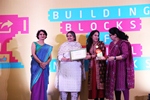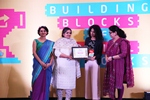Winners
 Initiative: MedHealth TV
Initiative: MedHealth TV
Organization: MedHealth TV
Country: India
Facebook: @Medhealthtv
Twitter: @MedHealthTV
Website: www.medhealthtv.com
MedHealth TV is a YouTube channel with more than 280 short animated and multimedia videos addressing issues of women health, pregnancy and postnatal care. The platform provides engaging and informative video-based content in Hindi, Telugu, Kannada and Tamil. It is because of their easy-to-understand content that has got the channel more than 22 million unique views in the last two years, and monthly viewership of 2.5 million.
Besides providing access to health videos via YouTube, MedHealth TV’s website enables peer to peer learning through a forum where users can communicate with a physician. As much as 90 per cent of MedHealth TV’s content is accessed from mobile devices across South Asia, primarily India and Pakistan, and the Middle East, earning the channel more than 100 shares on social media every day. The platform has recently started and online and telephonic chat service that provides users with relevant information on a chargeable basis.
 Initiative: #BHL (Bigdi Hui Ladki / Bigda Hua Ladka)
Initiative: #BHL (Bigdi Hui Ladki / Bigda Hua Ladka)
Organization: BBC Media Action (India)
Country: India
Facebook: @BBCMediaActionIndia
Twitter: @BBCMediaActionIndia
Website: www.bbc.com
In spite of modernisation and development, India, as a society still carries a lot of baggage from a traditional past that limits the identity, agency, autonomy and therefore, the future of its young people. They continue to live in the shadow of parental authority, in a patriarchal society with deep rooted gender discrimination, that forms a force-field of social expectations around them. This force-field is perpetuated by a string of gender stereotypes that harm both boys and girls and a culture of silence that punishes any form of non-conformity. It is further perpetuated by unreasonable standards of ‘good’ behaviour, which are distinctly different for boys and girls.
#BHL was a gender-agnostic hashtag campaign that aimed to identify and deconstruct gender stereotyping labels such as Bigdi Hui Ladki or Bigda Hua Ladka among boys and girls aged between 16 and 25. It used the social media platforms of Facebook, Twitter, Instagram and WhatApp over a period of 11 weeks to spark relevant conversations about gender stereotypes and labels, thus reaching out to over 13 million people.
 Initiative: Sehat Kahani
Initiative: Sehat Kahani
Organization: Sehat Kahani
Country: Pakistan
Facebook: @SehatKahaniOfficial
Twitter: @SehatKahani
Website: www.sehatkahani.com
Around 40 million people live below the poverty line in Pakistan and 30 per cent of the country lacks access to even primary health care facilities. Sehat Kahani is a tele-health startup that aims to democratise healthcare in Pakistan through a network of all-female health providers to deliver quality healthcare solutions through access, prevention and efficiency. The platform connects out-of-work female doctors to underserved patients in low and middle income markets across three provinces through the establishment of 14 eHealth clinics which have reached out to more than 53,000 patients.
Sehat Kahani uses all popular social media tools, including Facebook, Twitter, Instagram, Snapchat, YouTube, Pinterest and WhatsApp to reach out to a wider audience and initiate dialogues around taboo topics like doctor brides, rape and even pedophilia. Through Twitter and Instagram, Sehat Kahani has been able to assist patients who were previously clueless about medical assistance. Its Facebook Female Health Provider Network allows 1,200 health professionals (doctors, nurses, community health workers and medical students) to interact with each other.
Special Mentions
 Initiative: Saahas
Initiative: Saahas
Organization: The Red Elephant Foundation
Country: India
Facebook: @TheRedElephantFoundation
Twitter: @TheRedElephnt
Website: www.redelephantfoundation.org
Survivors who have faced violence either don’t know where to go for help, or don’t have resources to find out where to go for help. Sometimes, their situation prevents them from finding help, and that can be extremely dangerous to their safety.
Saahas is a Facebook chatbot and a mobile and Web-based app, conceptualised by the Red Elephant Foundation, that provides services for survivors of gender-based violence and child support. The name Saahas, in Hindi, translates to “courage”, and it is courage that it aims to give the users of the app and the chat bot. The Saahas directory of support comprises over 40,000 organisations across 196 countries offering medical, legal, education and employment services, besides food, shelter, clothing and emergency support. Its Facebook-enabled chatbot, especially, is aimed at empowering survivors to find help and counseling immediately. Users can also visit the Facebook page to pull up information and helpline numbers. So far, the Saahas has been able to reach out to 3,000 survivors worldwide, primarily through Facebook
 Initiative: LahuKaLagaan (Blood Tax)
Initiative: LahuKaLagaan (Blood Tax)
Organization: SheSays India
Country: India
Facebook: @shesaysindia
Twitter: @shesaysindia
Website: www.shesays.in
#LahuKaLagaan is global campaign for tax-free sanitary napkins that was launched in 2017 to support SheSays India’s campaign for the same, which was started in 2016. The awareness campaign was successful in breaking several taboos associated with menstruation and making it a mainstream topic of conversation among the masses and in media. The hashtag, which got over 24 million impressions on Twitter in less than 24 hours, encouraged women to make their own videos, asking the Finance Minister to drop the tax on sanitary napkins.
The campaign was an instant hit and spread like wildfire with several well-known personalities taking to social media to speak up on the issue. Soon enough, celebrities like Vishal Dadlani, Aditi Rao Hydari and Mallika Dua were posting on social media, especially Facebook, Twitter and Instagram, urging the Government of India to make sanitary napkins tax-free. The message was simple, sanitary napkins are an item of necessity and not of luxury.

